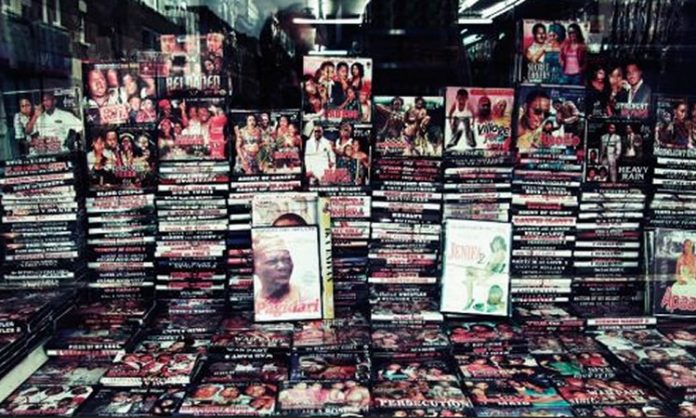‘Africa at the Movies’
Saturday 21st July, 11am at Queen Elizabeth Hall
The Nigerian film industry produces more than 2,000 films a year, is worth over £250 million and is the world’s second largest after Bollywood. At Africa Utopia, the editor of African Screens and TV director of the Nollywood movie awards Don Omope, David Somerset, curator of the BFI’s African Odyssey season, film writer for ‘Africa is A Country‘ Basia L Cummings and two of the youth delegates came together to discuss this phenomenon and the future direction of African cinema and African film.
Interview
We caught up with Basia Cummings, writer, editor, and film festival programmer before the event to find out some more about African cinema.
1. Why don’t we see more African films in UK cinemas?
It depends where we expect to ‘see’ them. There are very few African films in European cinemas because a small number of productions secure theatrical release with a European distributor. Film festivals are a great place to see African films, as are universities and specialist events, but in general, the market dictates the kinds of films we see on the big screen. A film like Prometheus, which will guarantee an audience, will always win out over Viva Riva! or A Screaming Man.
However, looking to the cinemas as a signifier of the health of African cinema in general is becoming increasingly naïve. Where I live, in South London, there are countless kiosks and shops selling thousands of Nollywood films. These films, which go straight to DVD, are the foundation of Nigeria’s booming film industry, now the third largest in the world. From the looks of the kiosks, African films, in particular Nigerian and Ghanaian, have a stalwart audience.
2. What makes Nollywood unique in comparison to other film industries?
I think Nollywood is so successful because it has already anticipated and reacted to the future of moving image distribution that the rest of the world, particularly Europe, is yet to recognise. By this I mean that Nollywood has understood that the distribution of information benefits from freer, looser forms of control, and that the way Nigerian’s distribute materials; by pirating, sharing, hosting screenings, actually works in the service of the production companies, rather than the other way around. By releasing films straight to DVD, Nollywood has flooded the market of African film and thereby ensured its dominance. This, clearly, shows that the system works. It challenges the European distribution model very profoundly.
Secondly, Nollywood’s sheer output is unmatched. The Nigerian film industry produces hundreds of thousands of films each year. Nollywood has condensed the filmmaking process, it stays close to its audience, produces and reproduces a similar set of narratives.
3. What other kinds of filmmaking and distribution are taking place on the continent at the moment?
There are a few exciting film projects that I’ve come across in the last few months, which are directly reacting to the political changes on the continent. The Mosireen Cinema in Tahrir Square is an exciting collective seeking to collaboratively collate a people’s archive from various footage of the protests of January last year. One of the founders, Khalid Abdalla says of the project;
“The majority of the footage is amateur, but a lot of it is filmed by us or by our friends… It’s part of the culture of creative commons, an open sourcing for film that allows us to share our stories. We did an open call for people to make films which we were planning to have screened on TV but then the sit-in started again and three days ago we decided to start screening in the square.”
I’m excited by this open, collective filmmaking. Chop Cassava, the TV channel and blog that sprung up during the huge Occupy Nigeria protests in January and February this year did a similar thing. As a reaction to the removal of the fuel subsidy, thousands, perhaps millions took to the street in Lagos to protest. It was the largest peaceful protest in Africa for decades, and went woefully unreported in the rest of the world. As a reaction to this, Chop Cassava documented each day by posting a short film on their blog.
If western journalists are hesitant to report about Africa, unable to find a ‘bridge’ character, or unwilling to report stories outside of cliché’s like ‘Africa rising’ or ‘darkest Africa’, then it is up to Africans themselves to fill the gap with informed, comprehensive and important news, and this is what Chop Cassava did through film.
4. There has been quite a lot of talk about African science fiction in film and literature at the moment. Could you tell us something about this and which African films would you say fit into this category?
There has been a bit of a tide of sci-fi at the moment, indeed. In the UK at least, it was triggered by Al Cameron and Nav Haq’s exhibition at the Arnolfini in Bristol, ‘Superpower: Africa in Science Fiction’ The exhibition was an interesting assembly of moving image works that conterminously critiqued ‘Africa’ and ‘science fiction’ as a set of ideas. No doubt contributing to the rise of African sci-fi was Wanuri Kahui’s film Pumzi and the Southbank’s recent African sci-fi screening as part of its African Utopia season. There are some links to the musical and theoretical notions of afro-futurism too, although I’d argue that the Arnolfini exhibition took a difference approach to those taken by say, writers and artists like Kodwo Eshun, or indeed Missy Elliot.
5. What are your top three classic African films?
In no particular order, I’d choose Touki Bouki by Djibril Diop Mambety, a surreal, witty, beautiful film draped in symbolic images, a true road movie. It follows the love story of a young couple, Mory and Anta. Next, undoubtedly Lionel Rogosin’s Come Back Africa, a truly astounding bit of covert fiction filmmaking made by Rogosin during Apartheid in South Africa. The script was co-written by the Drum magazine writers, and its not only a harrowing narrative, but a lasting document of Sophiatown, the township that was razed to the ground very soon after the film was made. Third, I’ll choose Octobre by Abderrahmane Sissako, a black and white film shot in Moscow (another love story) which contemplates the relationship between African students in Russia and the ‘socialist friendship’ that was extended to many African countries on the brink of, or soon after independence.
6. What are the three most interesting African films you have come across in 2012 – fiction or documentary?
A tough question! I was very impressed by Dear Mandela, by Dara Kell and Christopher Nizza. Its a documentary that follows a group of people defending informal settlements in South Africa. Its quite a surprising film, it seems to follow a conventional documentary format, but momentarily it shifts its visual register, and beautiful, slightly slowed down sequences show life in the settlements with amazing visual sensitivity.
Next, a film I haven’t seen yet but I’m awaiting eagerly; Searching for Sugarman by Malik Bendjelloul.
And finally, I’d say The 9 Muses by John Akomfrah. His address of migration, collective history and myth has been particularly interesting for me this year, particularly in the light of the devastating reports of migrants left to die in the Mediterranean ocean. Akomfrah’s film seemed to offer an attentive, historical and mythical commentary on migration. Perhaps as an interesting counterpoint to Akomfrah’s film, I’d recommend watching some of the films made by the ZaLab collective in Italy, who in collaboration with the Archive of Migrant Memories, are documenting the stories of migrants leaving North Africa for Italy and Spain in the last year.
To keep up-to-date with the conversation about African cinema, follow Basia on the blog ‘mishearances’ and Film Africa 2012(coming to London this November).




















